#依赖条件
安装了 metallb 和 cert-manager
安装了默认存储类
 部署 gitlab
部署 gitlab
1
2
3
4
5
6
7
8
9
10
11
12
13
14
15
16
17
18
19
20
21
22
23
24
25
26
27
28
29
30
31
32
33
34
35
36
37
38
39
40
41
42
43
44
|
helm upgrade --install gitlab \
--namespace=gitlab \
--create-namespace \
--timeout 600s \
--set global.edition=ce \
--set gitlab-runner.install=false \
--set global.hosts.domain=example.com \
--set certmanager-issuer.email=me@example.com gitlab/
#shuchu
Error: Unable to continue with install: CustomResourceDefinition "certificaterequests.cert-manager.io" in namespace "" exists and cannot be imported into the current release: invalid ownership metadata; label validation error: missing key "app.kubernetes.io/managed-by": must be set to "Helm"; annotation validation error: missing key "meta.helm.sh/release-name": must be set to "gitlab"; annotation validation error: missing key "meta.helm.sh/release-namespace": must be set to "gitlab"
# 安装
kubectl apply -f https://github.com/jetstack/cert-manager/releases/download/v1.8.0/cert-manager.crds.yaml
kubectl edit crd certificaterequests.cert-manager.io
#安装gitlab-runner
helm upgrade --install gitlab \
--namespace=gitlab \
--set gitlab-runner.install=true \
--set gitlab-runner.certsSecretName=gitlab-runner-certs \
--reuse-values gitlab/
|
注意这里遇到问题,需要给 gitlab-runner 配置 hosts 解析

重启 coredns 的 pod
1
|
kubectl -n kube-system rollout restart deployment.apps/coredns
|
修改 localdns 的配置
1
2
3
4
5
6
7
8
9
10
11
12
13
14
15
16
17
18
19
20
21
22
23
24
25
26
27
28
29
30
31
32
33
34
35
36
37
38
39
40
41
42
43
44
45
46
47
48
49
50
51
52
53
54
55
56
57
58
59
60
|
kubectl edit cm -n kube-system node-local-dns
apiVersion: v1
data:
Corefile: |
cluster.local:53 {
errors
cache {
success 9984 30
denial 9984 5
}
reload
loop
bind 169.254.20.10 __PILLAR__DNS__SERVER__
forward . 10.96.0.10 {
force_tcp
}
prometheus :9253
health 169.254.20.10:8080
}
in-addr.arpa:53 {
errors
cache 30
reload
loop
bind 169.254.20.10 __PILLAR__DNS__SERVER__
forward . 10.96.0.10 {
force_tcp
}
prometheus :9253
}
ip6.arpa:53 {
errors
cache 30
reload
loop
bind 169.254.20.10 __PILLAR__DNS__SERVER__
forward . 10.96.0.10 {
force_tcp
}
prometheus :9253
}
.:53 {
errors
cache 30
reload
loop
bind 169.254.20.10 __PILLAR__DNS__SERVER__
#forward . __PILLAR__UPSTREAM__SERVERS__ # 线上dns解析默认是不通过coredns
forward . 10.96.0.10 { # 修改为转发coredns解析
force_tcp
}
prometheus :9253
}
kind: ConfigMap
metadata:
labels:
addonmanager.kubernetes.io/mode: Reconcile
name: node-local-dns
namespace: kube-system
|
重启 localcoredns
测试一下是否可以正常访问到 gitlab.example.com

这里涉及到的原理如下
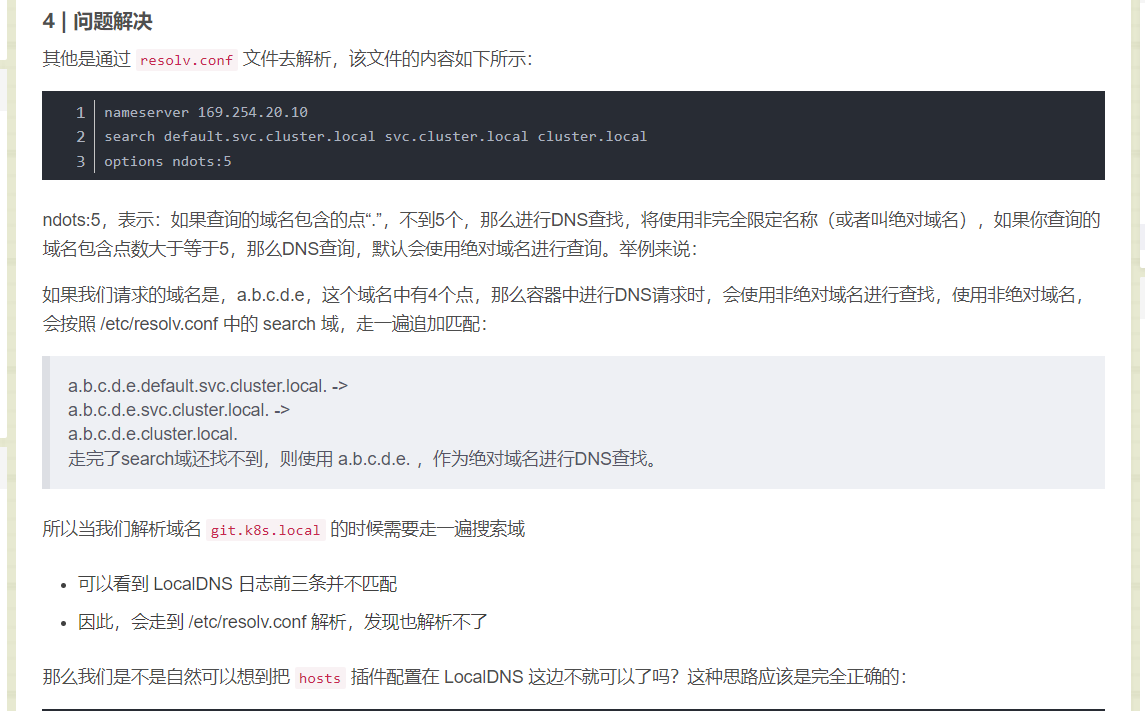
为什么需要 NodeLocalDNS
处于 ClusterFirst 的 DNS 模式下的 Pod 可以连接到 kube-dns 的 serviceIP 进行 DNS 查询,通过 kube-proxy 组件添加的 iptables 规则将其转换为 CoreDNS 端点,最终请求到 CoreDNS Pod。
通过在每个集群节点上运行 DNS 缓存,NodeLocal DNSCache 可以缩短 DNS 查找的延迟时间、使 DNS 查找时间更加一致,以及减少发送到 kube-dns 的 DNS 查询次数。
在集群中运行 NodeLocal DNSCache 有如下几个好处:
- 如果本地没有 CoreDNS 实例,则具有最高 DNS QPS 的 Pod 可能必须到另一个节点进行解析,使用
NodeLocal DNSCache 后,拥有本地缓存将有助于改善延迟
- 跳过 iptables DNAT 和连接跟踪将有助于减少 conntrack 竞争并避免 UDP DNS 条目填满 conntrack 表(上面提到的 5s 超时问题就是这个原因造成的)
- 从本地缓存代理到 kube-dns 服务的连接可以升级到 TCP,TCP conntrack 条目将在连接关闭时被删除,而 UDP 条目必须超时(默认
nfconntrackudp_timeout 是 30 秒)
- 将 DNS 查询从 UDP 升级到 TCP 将减少归因于丢弃的 UDP 数据包和 DNS 超时的尾部等待时间,通常长达 30 秒(3 次重试+ 10 秒超时)
- 具体内容查看这个:https://www.lixueduan.com/posts/kubernetes/23-node-local-dns/
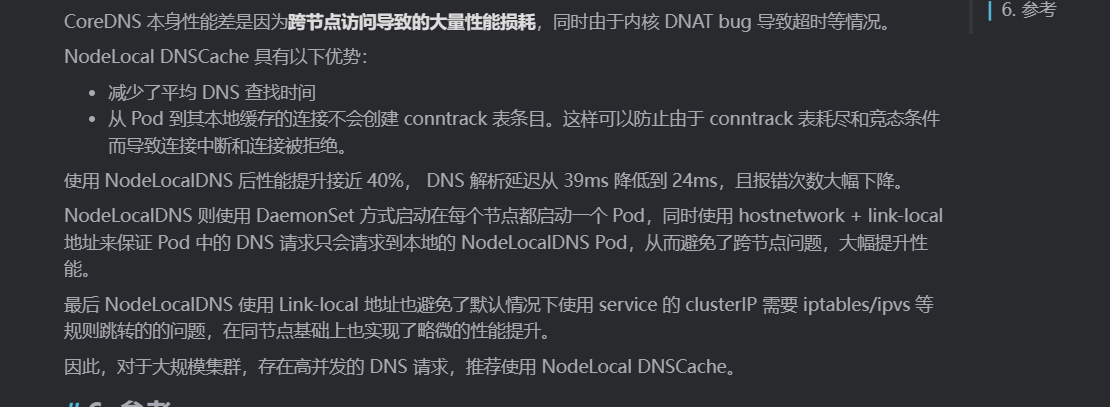
导出 gitlab 自签名证书
1
2
3
4
5
6
7
|
kubectl -n gitlab get secret gitlab-gitlab-tls --template='{{ index .data "tls.crt" }}' | base64 -d > gitlab.crt
kubectl -n gitlab create secret generic gitlab-runner-certs \
--from-file=gitlab.example.com.crt=gitlab.crt \
--from-file=registry.example.com.crt=gitlab.crt \
--from-file=minio.example.com.crt=gitlab.crt
kubectl -n gitlab get secret example-com-tls --template='{{ index .data "tls.crt" }}' | base64 -d > gitlab.crt
|
#接下来安装 gitlab-runner
1
2
3
4
5
|
helm upgrade --install gitlab \
--namespace=gitlab \
--set gitlab-runner.install=true \
--set gitlab-runner.certsSecretName=gitlab-runner-certs \
--reuse-values gitlab/
|
接下来查看成功展示吧
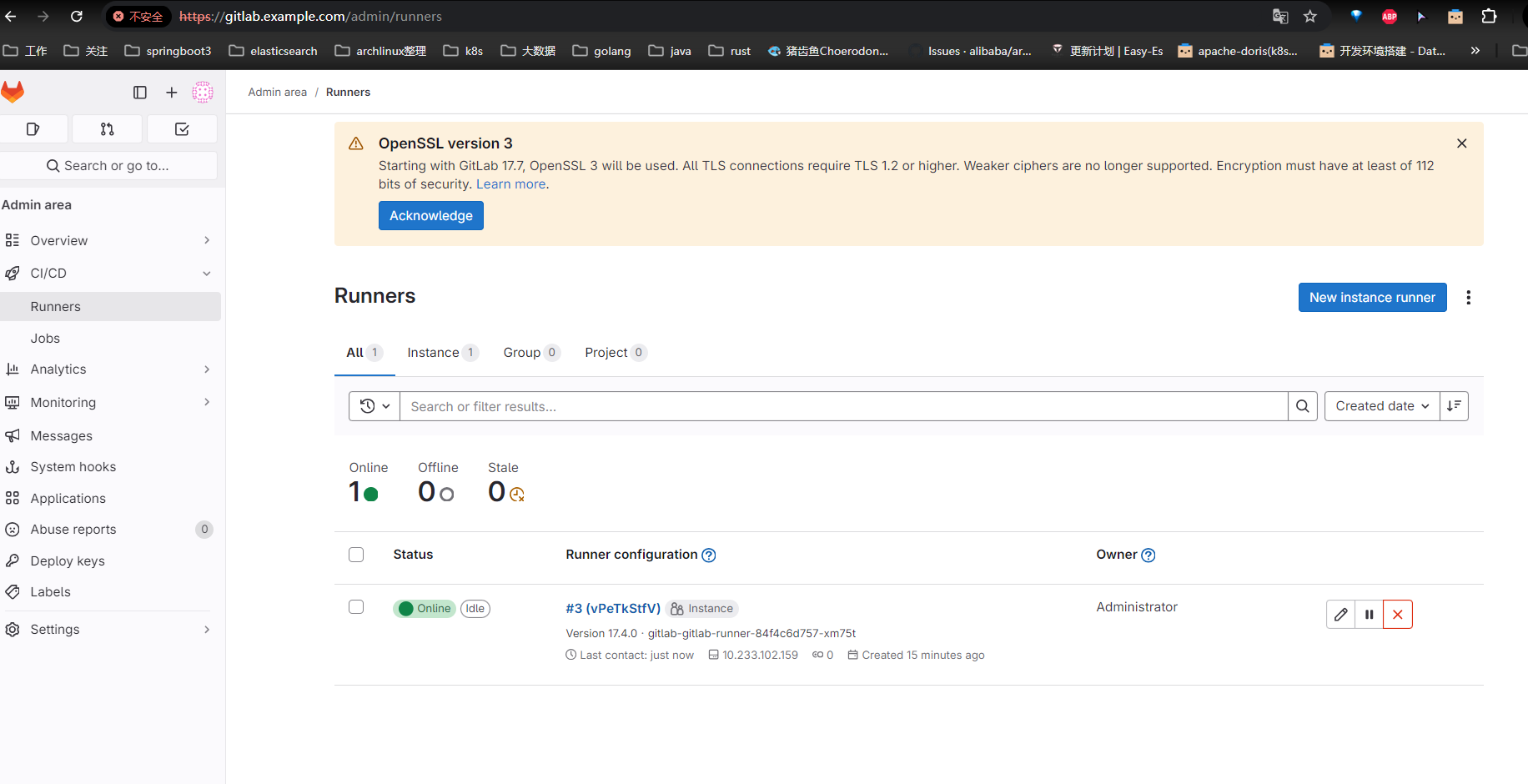 可以部署一个 job 测试一下
新建要给项目 ci_test,添加以下这个文件
.gitlab-ci.yml
可以部署一个 job 测试一下
新建要给项目 ci_test,添加以下这个文件
.gitlab-ci.yml
1
2
3
4
5
6
7
8
9
10
11
12
13
14
15
16
17
18
19
20
21
22
23
24
25
26
27
28
29
30
31
32
33
34
35
36
37
|
# 设置执行镜像
image: busybox:latest
# 整个pipeline有两个stage
stages:
- build
- test
# 定义全局缓存,缓存的key来自分支信息,缓存位置是vendor文件夹
cache:
key: ${CI_COMMIT_REF_SLUG}
paths:
- vendor/
before_script:
- export
- echo "Before script section"
after_script:
- echo "After script section"
build1:
stage: build
tags:
- k8s
script:
- echo "将内容写入缓存"
- mkdir -p vendor
- echo "build" > vendor/hello.txt
test1:
stage: test
tags:
- k8s
script:
- echo "从缓存读取内容"
- cat vendor/hello.txt
|
注意 runner 需要有 k8s 的 tag 才可以运行。
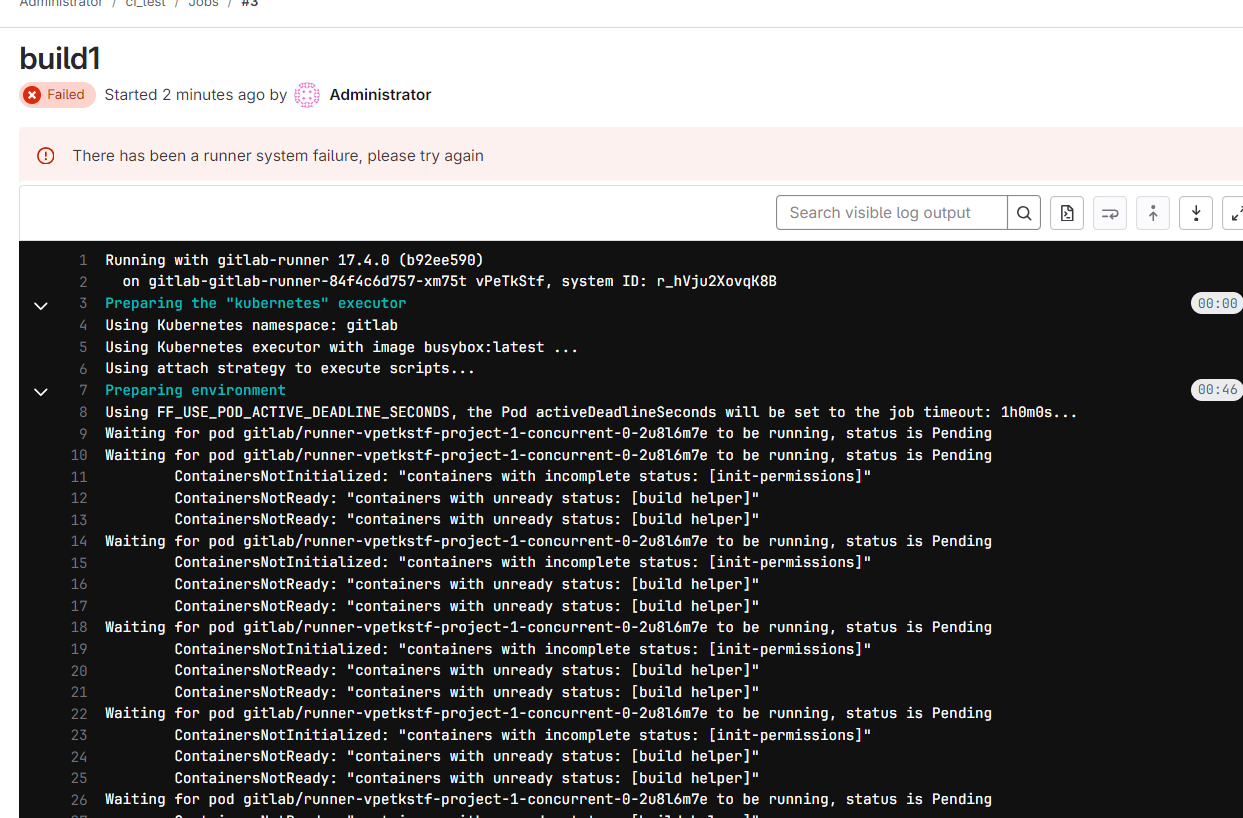
这里使用 istio-gw 来代理服务
1
2
3
4
5
6
7
8
9
10
11
12
13
14
15
16
17
18
19
20
21
22
23
24
25
26
27
28
29
30
31
32
33
34
35
36
37
38
39
40
41
42
43
44
45
46
47
48
49
50
51
52
53
54
55
56
57
58
59
60
61
62
63
64
65
66
67
68
69
70
71
72
73
74
75
76
77
78
79
80
81
82
83
84
85
86
87
88
89
90
91
92
93
94
95
96
97
98
99
100
101
102
103
104
105
106
107
108
109
110
111
112
113
114
115
116
117
118
119
120
121
122
123
124
125
126
|
openssl req -out example_certs1/gitlab.example.com.csr -newkey rsa:2048 -nodes -keyout example_certs1/gitlab.example.com.key -subj "/CN=gitlab.example.com/O=gitlab organization"
openssl x509 -req -sha256 -days 365 -CA example_certs1/example.com.crt -CAkey example_certs1/example.com.key ```bash
-config san.cnf
``` -set_serial 1 -in example_certs1/gitlab.example.com.csr -out example_certs1/gitlab.example.com.crt
kubectl create -n istio-system secret tls gitlab-credential \
--key=example_certs1/gitlab.example.com.key \
--cert=example_certs1/gitlab.example.com.crt
cat <<EOF | kubectl apply -f -
apiVersion: gateway.networking.k8s.io/v1
kind: Gateway
metadata:
name: mygateway
namespace: istio-system
spec:
gatewayClassName: istio
listeners:
- name: https-gitlab
hostname: "gitlab.example.com"
port: 443
protocol: HTTPS
tls:
mode: Terminate
certificateRefs:
- name: gitlab-credential
allowedRoutes:
namespaces:
from: Selector
selector:
matchLabels:
kubernetes.io/metadata.name: gitlab
EOF
cat <<EOF | kubectl apply -f -
apiVersion: gateway.networking.k8s.io/v1
kind: HTTPRoute
metadata:
name: helloworld
namespace: gitlab
spec:
parentRefs:
- name: mygateway
namespace: istio-system
hostnames: ["gitlab.example.com"]
rules:
- matches:
- path:
type: PathPrefix
value: /
backendRefs:
- name: gitlab-webservice-default
port: 8181
EOF
curl -v -HHost:gitlab.example.com --resolve "gitlab.example.com:$SECURE_INGRESS_PORT:$INGRESS_HOST" \
--cacert example_certs1/example.com.crt "https://gitlab.example.com:$SECURE_INGRESS_PORT/"
kubectl -n gitlab get secret | grep initial-root-password
kubectl -n gitlab get secret gitlab-gitlab-initial-root-password -o jsonpath='{.data.password}' | base64 -d
|
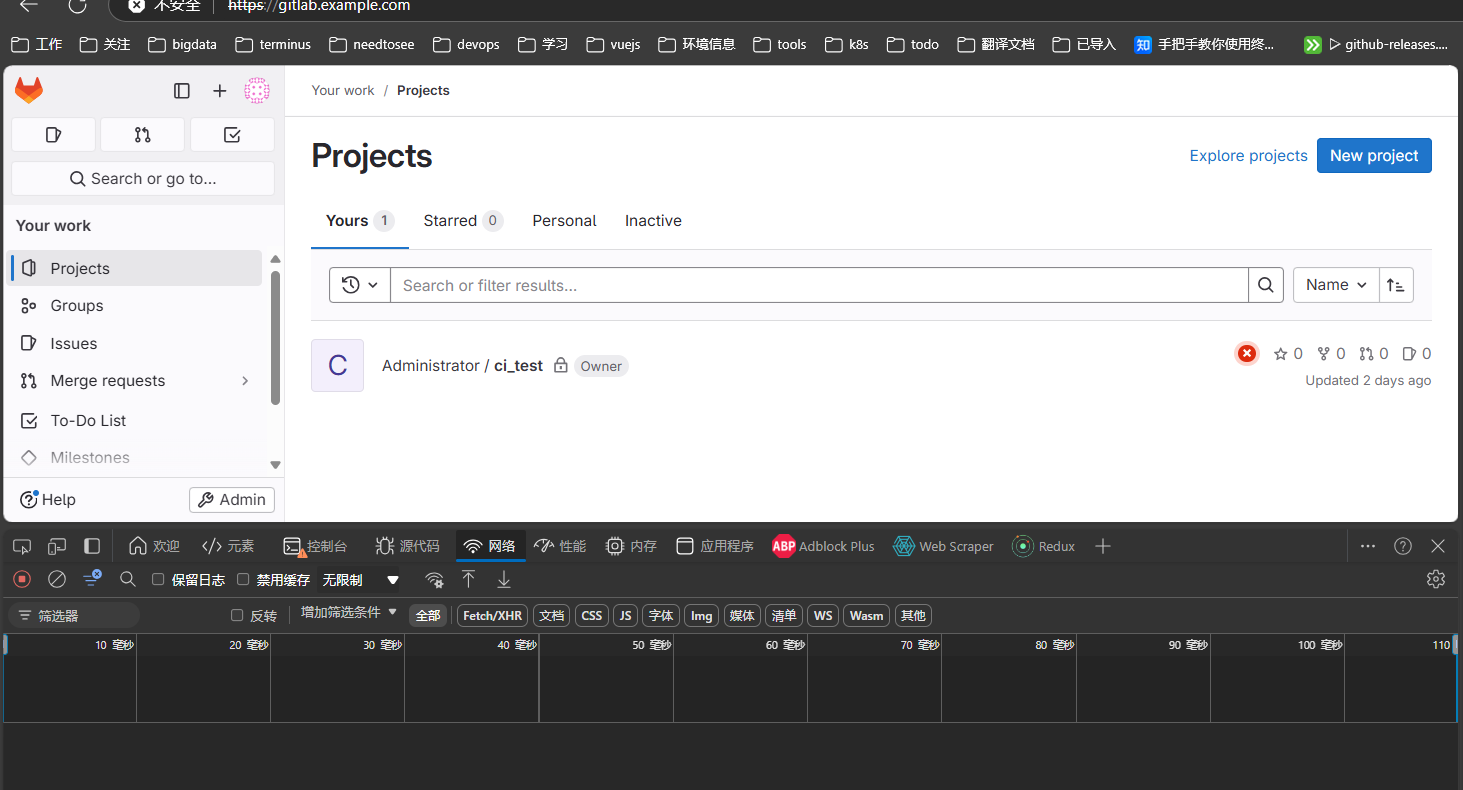 创建 gitlab 对应的 gateway
创建 gitlab 对应的 gateway

1
2
3
4
5
6
7
8
9
10
11
12
13
14
15
16
17
18
19
20
21
22
23
24
25
26
27
|
cat <<EOF | kubectl apply -f -
apiVersion: gateway.networking.k8s.io/v1
kind: Gateway
metadata:
name: mygateway
namespace: istio-system
spec:
gatewayClassName: istio
listeners:
- name: https
hostname: "gitlab.example.com"
port: 443
protocol: HTTPS
tls:
mode: Terminate
certificateRefs:
- name: gitlab-credential
options:
gateway.istio.io/tls-terminate-mode: MUTUAL
allowedRoutes:
namespaces:
from: Selector
selector:
matchLabels:
kubernetes.io/metadata.name: apps-gitlab
EOF
|
部署 gitlab-shell
创建 gateway
1
2
3
4
5
6
7
8
9
10
11
12
13
14
15
16
17
18
19
20
21
22
23
24
25
26
27
28
29
30
|
cat <<EOF | kubectl apply -f -
apiVersion: gateway.networking.k8s.io/v1
kind: Gateway
metadata:
name: mygateway
namespace: istio-system
spec:
gatewayClassName: istio
listeners:
- name: https
hostname: "gitlab.example.com"
port: 443
protocol: HTTPS
tls:
mode: Terminate
certificateRefs:
- name: gitlab-credential
allowedRoutes:
namespaces:
from: Selector
selector:
matchLabels:
kubernetes.io/metadata.name: apps-gitlab
- name: ssh
port: 22
protocol: TCP
allowedRoutes:
kinds:
- kind: TCPRoute
EOF
|
在界面上可以看到暴露的 ssh 服务了

1
2
3
4
5
6
7
8
9
10
11
12
13
14
15
16
17
18
19
|
# 注意这个tcp是为了给ssh服务暴露使用的
#接下里是绑定ssh端口和服务
cat << EOF | kubectl apply -f -
apiVersion: gateway.networking.k8s.io/v1alpha2
kind: TCPRoute
metadata:
name: tcp-app-1
namespace: apps-gitlab
spec:
parentRefs:
- name: my-gateway
sectionName: ssh
rules:
- backendRefs:
- name: gitlab-gitlab-shell
port: 22
EOF
tcproute.gateway.networking.k8s.io/tcp-app-1 created
|
这里需要注意一下,crd 的安装需要先做,不然会失败
1
|
kubectl apply -f https://github.com/kubernetes-sigs/gateway-api/releases/download/v1.2.0/standard-install.yaml
|
注意因为使用了 tcproute 等实验特性需要在安装一下实验 crd
1
|
kubectl apply -f https://github.com/kubernetes-sigs/gateway-api/releases/download/v1.2.0/experimental-install.yaml
|
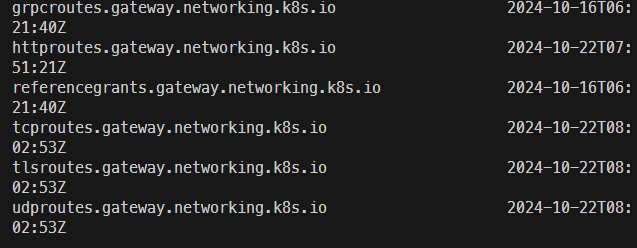
安装好后,实验一下 git 的 ssh 看看
1
2
3
4
5
6
7
8
9
10
11
12
13
14
15
16
|
git push --set-upstream origin master
The authenticity of host 'gitlab.example.com (10.7.10.159)' can't be established.
ED25519 key fingerprint is SHA256:hFzSmmh6EAmyYL2oMEa6I7QWZK9F/HKerkFp0MihLTE.
This key is not known by any other names.
Are you sure you want to continue connecting (yes/no/[fingerprint])? yes
Warning: Permanently added 'gitlab.example.com' (ED25519) to the list of known hosts.
Enumerating objects: 448, done.
Counting objects: 100% (448/448), done.
Delta compression using up to 6 threads
Compressing objects: 100% (244/244), done.
Writing objects: 100% (448/448), 6.28 MiB | 16.33 MiB/s, done.
Total 448 (delta 114), reused 448 (delta 114), pack-reused 0 (from 0)
remote: Resolving deltas: 100% (114/114), done.
To gitlab.example.com:root/servicemesh_arch_istio.git
* [new branch] master -> master
branch 'master' set up to track 'origin/master'.
|
可以看到代码传到了 gitlab 上,同时也触发了 pipeline
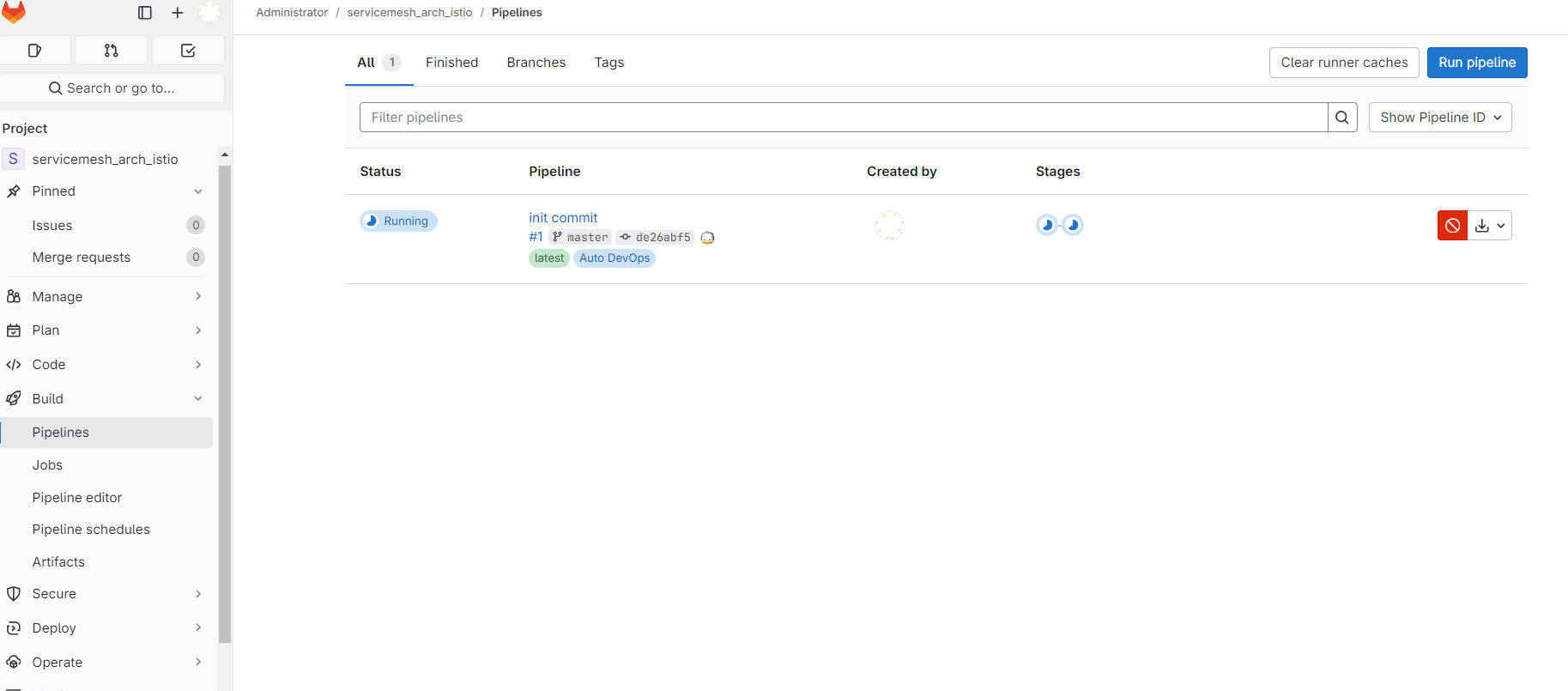 点开构建的助手可以看到报错了
点开构建的助手可以看到报错了
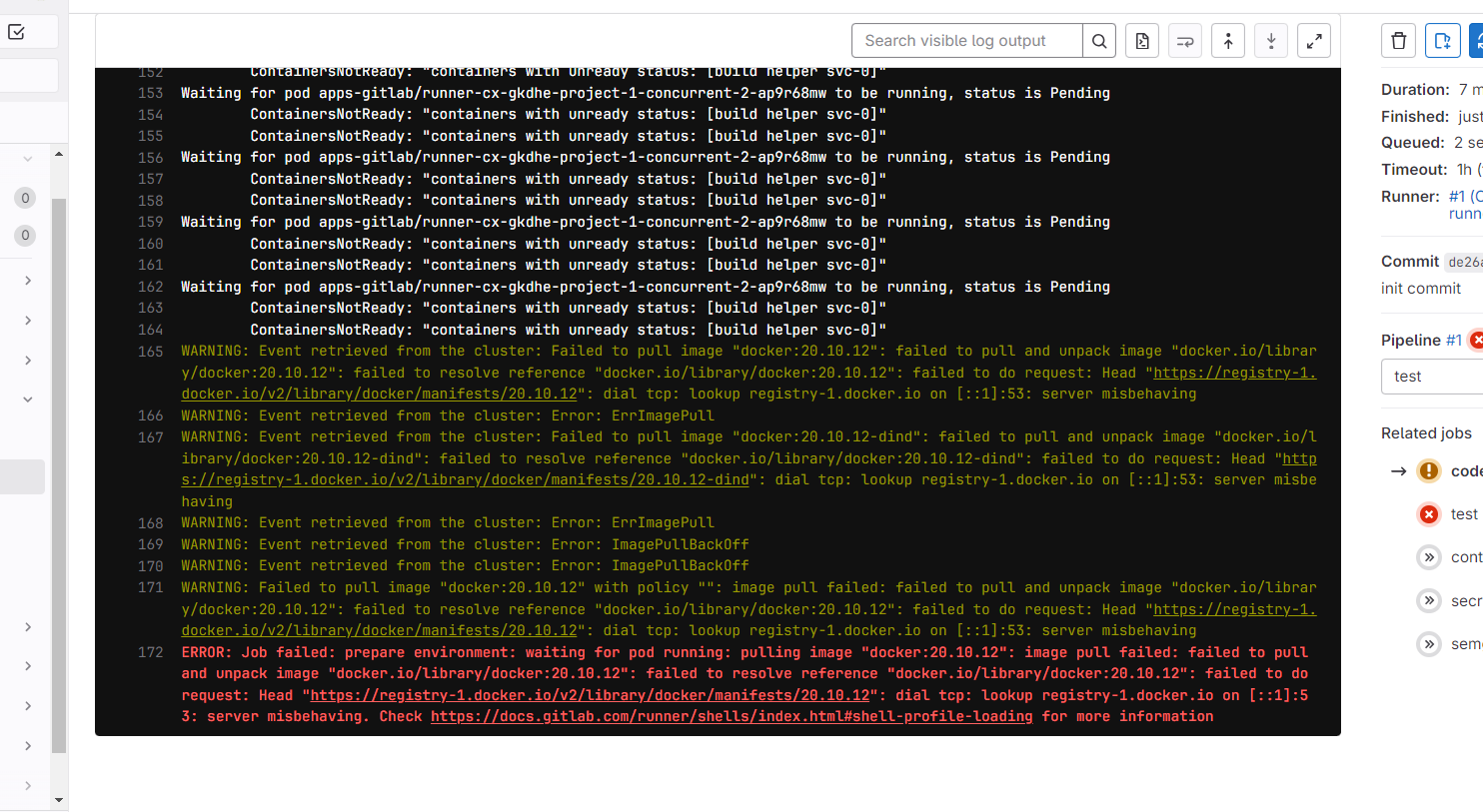 这个问题的解决是 dns 解析失败,无法正常下载 docker。
这个问题的解决是 dns 解析失败,无法正常下载 docker。
查看 coredns 是否正常解析
用 busybox 的 nslookup 来测试 dns 是否正常
1
|
kubectl run -it --image 10.7.20.12:5000/busybox:1.28.4 test --restart=Never --rm /bin/sh
|
containerd 配置
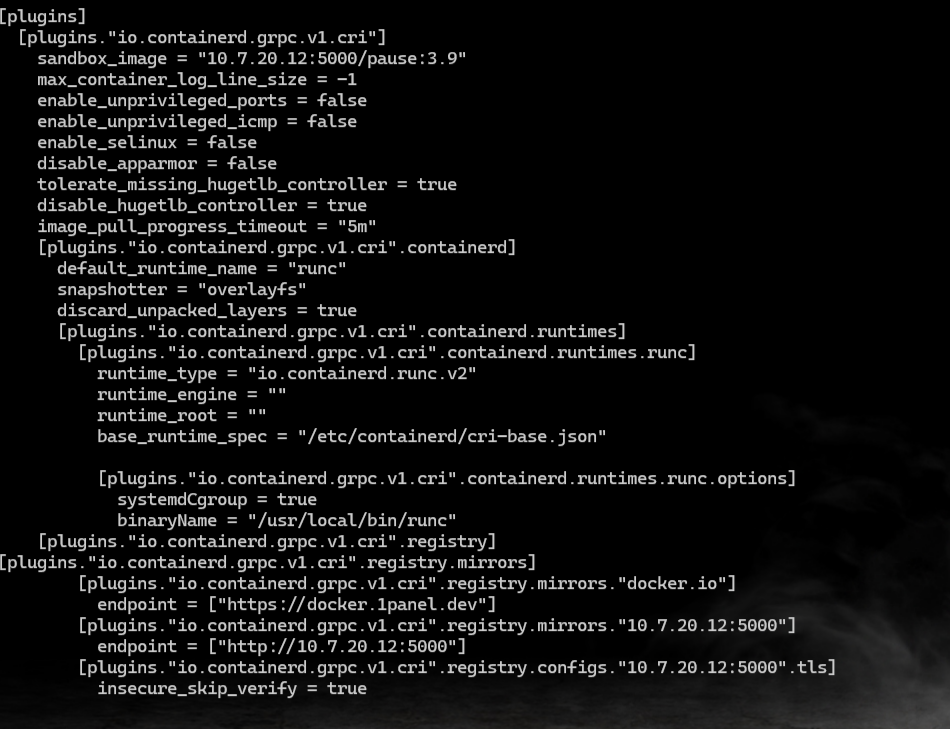 使用自定义的证书来安装 gitlab-runner
创建证书
使用自定义的证书来安装 gitlab-runner
创建证书
1
2
3
4
5
|
openssl genrsa -out ca.key 2048
openssl req -new -x509 -days 365 -key ca.key -subj "/C=CN/ST=GD/L=SZ/O=Acme, Inc./CN=Acme Root CA" -out ca.crt
openssl req -newkey rsa:2048 -nodes -keyout server.key -subj "/C=CN/ST=GD/L=SZ/O=Acme, Inc./CN=*.example.com" -out server.csr
openssl x509 -req -extfile <(printf "subjectAltName=DNS:example.com,DNS:gitlab.example.com") -days 365 -in server.csr -CA ca.crt -CAkey ca.key -CAcreateserial -out server.crt
|
注意就是 y9ong 这个证书到 gw 上,以及所有的服务上
接下来把之前的证书替换掉
1
2
3
4
|
kubectl delete -n istio-system secret gitlab-credential
kubectl create -n istio-system secret tls gitlab-credential \
--key=server.key \
--cert=server.crt
|
然后访问 web 界面下载下来证书,然后把这个证书再安装到 secret 中提供给 gitlab-runner 使用,另外注意 gitlab-runner 的配置文件如下:
1
2
3
4
5
6
7
8
9
10
11
12
13
14
15
16
17
18
19
20
21
22
23
24
25
26
27
28
29
30
31
32
33
34
35
36
37
38
39
40
41
42
43
44
45
46
47
48
49
50
51
52
53
54
55
56
57
58
59
60
61
62
63
64
65
66
67
68
69
70
71
72
73
74
75
76
77
78
79
80
81
82
83
84
85
86
87
88
89
90
91
92
93
94
95
96
97
98
99
100
101
102
103
104
105
106
107
108
109
110
111
112
113
114
115
116
117
118
119
120
121
122
123
124
125
126
127
128
129
130
131
132
133
134
135
136
137
138
139
140
141
142
143
144
145
146
147
148
149
150
151
152
153
154
155
156
157
158
159
160
161
162
163
164
165
166
167
168
169
170
171
172
173
174
175
176
177
178
179
180
181
182
183
184
185
186
187
188
189
190
191
192
193
194
195
196
197
198
199
200
201
202
203
204
205
206
207
208
209
210
211
212
213
214
215
216
217
218
219
220
221
222
223
224
225
226
227
228
229
230
231
232
233
234
235
236
237
238
239
240
241
242
243
244
245
246
247
248
249
250
251
252
253
254
255
256
257
258
259
260
261
262
263
264
265
266
267
268
269
|
registry:
enabled: false
certmanager-issuer:
# # The email address to register certificates requested from Let's Encrypt.
# # Required if using Let's Encrypt.
email: email@example.com
postgresql:
install: false
certmanager:
install: false
prometheus:
install: false
nginx-ingress:
enabled: false
global:
image:
registry: 10.7.20.12:5000
edition: ce
time_zone: Asia/Shanghai
kas:
enabled: false
minio:
enabled: false
hosts:
https: true
domain: example.com
gitlab:
name: gitlab.example.com
ingress:
enabled: false
psql:
host: postgres-postgresql.dev
database: gitlab_test
username: gitlab_test
password:
secret: gitlab-postgresql-secret
key: postgresql-password
appConfig:
lfs:
bucket: gitlab-gitlfs
connection:
secret: gitlab-minio-secret
key: connection
artifacts:
bucket: gitlab-artifacts
connection:
secret: gitlab-minio-secret
key: connection
uploads:
bucket: gitlab-uploads
connection:
secret: gitlab-minio-secret
key: connection
packages:
bucket: gitlab-packages
connection:
secret: gitlab-minio-secret
key: connection
dependencyProxy:
enabled: true
bucket: gitlab-dependency-proxy
connection:
secret: gitlab-minio-secret
key: connection
backups:
bucket: gitlab-backups
tmpBucket: gitlab-backups-tmp
defaultProjectsFeatures:
issues: true
mergeRequests: true
wiki: true
snippets: true
builds: true
containerRegistry: false
gitlab:
webservice:
registry:
enabled: false
resources:
requests:
cpu: 150m
sidekiq:
registry:
enabled: false
resources:
requests:
cpu: 200m
toolbox:
backups:
objectStorage:
config:
secret: gitlab-minio-secret
key: config
gitaly:
persistence:
size: 20Gi
gitlab-runner:
runners:
privileged: true
config: |
[[runners]]
pre_get_sources_script = "echo '10.7.10.159 gitlab.example.com' >> /etc/hosts \n git config --global http.sslVerify false\n"
[runners.kubernetes]
image = "debian:bullseye"
privileged = true
image_pull_secrets = []
[runners.cache]
Type = "s3"
Path = "runners"
Shared = true
[runners.cache.s3]
ServerAddress = "http://10.7.20.12:9000"
AccessKey = "admin"
SecretKey = "123456"
BucketName = "gitlab-caches"
BucketLocation = "cn-north-1"
Insecure = true
gitlabUrl: https://gitlab.example.com/
runnerToken: ''
runnerRegistrationToken: '61tguLPY3FYuYxNKjLqTHAiVO5pl7Wvy4kgOrUHPNC8jUuKZRx47oQ37Cr1cG4kR'
certsSecretName: gitlab-runner-certs
rbac:
create: true
rules:
- apiGroups: [''] #"" indicates the core API group
resources: ['*']
verbs: ['*']
- apiGroups: ['networking.k8s.io']
resources: ['ingresses']
verbs: ['*']
- apiGroups: ['apps']
resources: ['deployments']
verbs: ['*']
clusterWideAccess: true
serviceAccountName: gitlab-runner
|
注意检验 CA 证书
1
2
3
4
5
|
curl -v -HHost:gitlab.example.com --resolve "gitlab.example.com:443:10.7.10.159" \
--cacert gitlab.example.com.crt "https://gitlab.example.com"
curl -v -HHost:gitlab.example.com --resolve "gitlab.example.com:443:10.7.10.159" \
--cacert gitlab.crt "https://gitlab.example.com"
|
查看是否把汗 SAN 的证书命令如下:
1
2
3
4
|
openssl x509 -in server.crt -text -noout | grep -A1 "Subject Alternative Name"
X509v3 Subject Alternative Name:
DNS:example.com, DNS:www.example.com
|
当看到上面的信息即可,不然会报错:
1
2
3
4
|
WARNING: Support for registration tokens and runner parameters in the 'register' command has been deprecated in GitLab Runner 15.6 and will be replaced with support for authentication tokens. For more information, see https://gitlab.com/gitlab-org/gitlab/-/issues/380872
ERROR: Registering runner... failed runner=******** status=couldn't execute POST against https://gitlab/api/v4/runners: Post "https://gitlab/api/v4/runners": x509: certificate relies on legacy Common Name field, use SANs instead
PANIC: Failed to register the runner.
|
参考文档:
https://stackoverflow.com/questions/75492168/gitlab-certificate-is-valid-for-domain-com-not-xxx-domain-com
https://forum.gitlab.com/t/registering-specific-runner-causes-403-on-api-v4-runners/77890
https://techgrunt.io/gitlab-runner-on-lan-with-self-signed-certificates
https://forum.gitlab.com/t/x509-certificate-relies-on-legacy-common-name-field-use-sans-instead/75478
gitlab runner 信任证书
命令下载证书
1
2
|
# 下载证书
openssl s_client -showcerts -connect gitlab.test.helm.xuxiaowei.cn:443 -servername gitlab.test.helm.xuxiaowei.cn < /dev/null 2>/dev/null | openssl x509 -outform PEM > gitlab.test.helm.xuxiaowei.cn.crt
|
参考文档:
https://gitlab-k8s.xuxiaowei.com.cn/gitlab-k8s/docs/helm/gitlab/gitlab-runner-trust-ssl.html
查看 helm 的镜像进行私有化
1
|
helm template gitlab-operator --set metrics.enabled=true | grep 'image: ' | sed 's/^.*image: //g' | sed "s/^\([\"']\)\(.*\)\1\$$/\2/g" | uniq >images.txt
|
gitlab 安装完后,使用了 bookstore1 项目来进行测试:
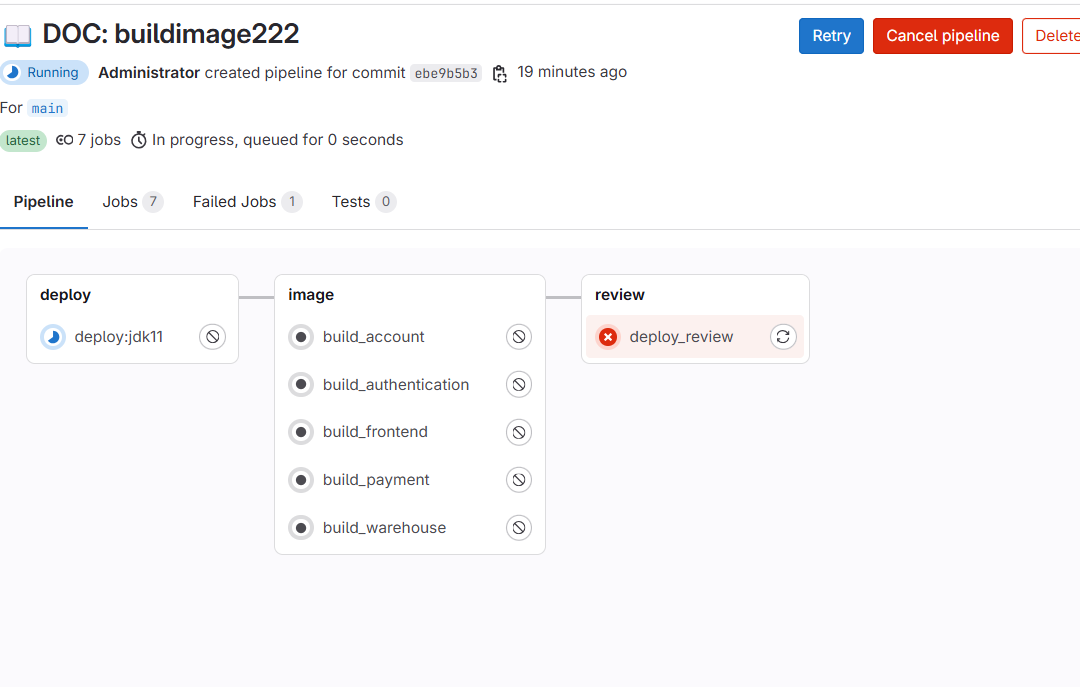 使用 kankio 来构建镜像,这样就不需要 docker 特权了。在 gitlab-ci 中这样配置对应的镜像即可。
使用 kankio 来构建镜像,这样就不需要 docker 特权了。在 gitlab-ci 中这样配置对应的镜像即可。
1
2
3
4
5
6
7
8
9
10
|
build_payment:
stage: image
image:
name: 10.7.20.12:5000/kaniko-project/executor:debug
entrypoint: ['']
script:
- /kaniko/executor
--context "${CI_PROJECT_DIR}"
--dockerfile "${CI_PROJECT_DIR}/bookstore-servicemesh-domain-payment/Dockerfile"
--destination "${CI_REGISTRY_IMAGE}/bookstore-servicemesh-domain-payment:${CI_COMMIT_TAG}"
|
 部署 gitlab
部署 gitlab



 可以部署一个 job 测试一下
新建要给项目 ci_test,添加以下这个文件
.gitlab-ci.yml
可以部署一个 job 测试一下
新建要给项目 ci_test,添加以下这个文件
.gitlab-ci.yml
 创建 gitlab 对应的 gateway
创建 gitlab 对应的 gateway



 点开构建的助手可以看到报错了
点开构建的助手可以看到报错了
 这个问题的解决是 dns 解析失败,无法正常下载 docker。
这个问题的解决是 dns 解析失败,无法正常下载 docker。 使用自定义的证书来安装 gitlab-runner
创建证书
使用自定义的证书来安装 gitlab-runner
创建证书 使用 kankio 来构建镜像,这样就不需要 docker 特权了。在 gitlab-ci 中这样配置对应的镜像即可。
使用 kankio 来构建镜像,这样就不需要 docker 特权了。在 gitlab-ci 中这样配置对应的镜像即可。